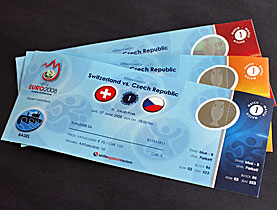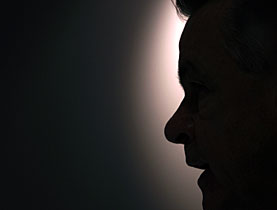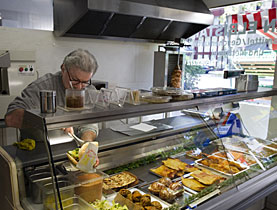Crackdown on illegal Euro 2008 ticket sales

Uefa says it is doing its utmost to combat illegal online ticket sales ahead of the 2008 European football championships but faces legal constraints.
European football’s governing body says it has already fined hundreds of people up to €5,000 (SFr8,055) for illegally reselling their tickets, which started to be printed and distributed this week.
Numerous websites are selling tickets for Euro 2008 games in Switzerland and Austria, with prices for the opening match starting at $1,000 (SFr1,038) and the best seats for the final in Vienna going for $7,000.
“It’s true that there are a lot of tickets available on the internet,” Martin Kallen, Euro 2008’s chief operating officer, told journalists in Geneva on Tuesday.
“We are keeping an eye on the websites and where it’s possible to act, in accordance with national laws, we are doing so. But there are so many sites and as long as you don’t have a clear indication where the ticket comes from, it’s hard for us to close cases.”
“In some countries we cannot get a court order that stops someone from reselling tickets,” Uefa spokesman William Gaillard told Associated Press.
As part of the original purchase conditions, holders are not allowed to pass on their tickets to other people for the tournament being taking place from June 7-29.
Gaillard said each ticket will be numbered and spot checks may be carried out to ensure that fans acquired them in accordance with Uefa rules.
He warned that “there’s absolutely no guarantee that when you go to the stadium you can get in” with a ticket bought through unofficial channels.
Tickets that are illegally sold on can be deleted and reassigned to others next on the long waiting list, warns Uefa.
Realism
Football fans might complain about how hard it has been to secure a Euro 2008 match ticket, but they have to be realistic, Uefa president Michel Platini told the news conference.
“If we’d asked [the host nations] for 80,000-seater stadiums, what would have happened to them after the Euro? What’s more, with 15 million requests there will always be 14 million people who will be disappointed,” he said.
The Frenchman rejected the idea that Euro 2008, with an estimated turnover of SFr2 billion, might be viewed as a moneymaking machine.
“Not at all,” he told swissinfo. “Uefa is a non-profitmaking organisation so everything is redistributed and the Euro is a major European competition where money is reallocated to the national federations for the development of football.”
“The Euro, like the World Cup and other major popular events, attracts a great deal of money. It interests lots of people, it drains a lot of money, and it’s up to us to use and redistribute it correctly,” said the Uefa president, who has previously attacked the influence of money and big business on the game.
Build up
“Everything is going well,” said Euro 2008’s chief operating officer in his overview of preparations 41 days before kick-off.
“All the stadiums are more or less ready. The only building work to complete is for journalists”.
Uefa will officially take charge of the eight tournament stadiums from May 12.
Kallen said that, unlike Euro 2004 in Portugal, where they had to virtually build everything from scratch, things had gone smoother in Switzerland.
“It’s true that there has been much less infrastructure work than in Portugal, as we finished the stadiums here in 2002-03. It’s been different work, putting the elements together,” he told swissinfo. “Everything is on track; in Portugal we were always late.”
Uefa officials do not seem too concerned by the little sign of impending football fever among the Swiss public.
“The event will take its true popular dimension when the teams start arriving in Switzerland (from June 2). It was the same in France before Euro 1984 and the 1998 World Cup,” said Platini.
swissinfo, Simon Bradley in Geneva
Switzerland will co-host the Euro 2008 football tournament together with Austria from June 7-29.
The 31 games will be played in four cities in Switzerland (Basel, Bern, Geneva and Zurich) and four cities in Austria (Innsbruck, Klagenfurt, Salzburg and Vienna).
The Letzigrund stadium in Zurich will play host to three matches: Romania – France on June 9, Italy – Romania on June 13 and France – Italy on June 17.
Up to 5.4 million football fans are expected to follow the tournament in Switzerland, including 1.4 million from abroad.
Swiss Federal Railways has announced it will put on an extra 3,800 services to its timetable and deploy 1,500 special customer advisors during the tournament.

In compliance with the JTI standards
More: SWI swissinfo.ch certified by the Journalism Trust Initiative




You can find an overview of ongoing debates with our journalists here . Please join us!
If you want to start a conversation about a topic raised in this article or want to report factual errors, email us at english@swissinfo.ch.